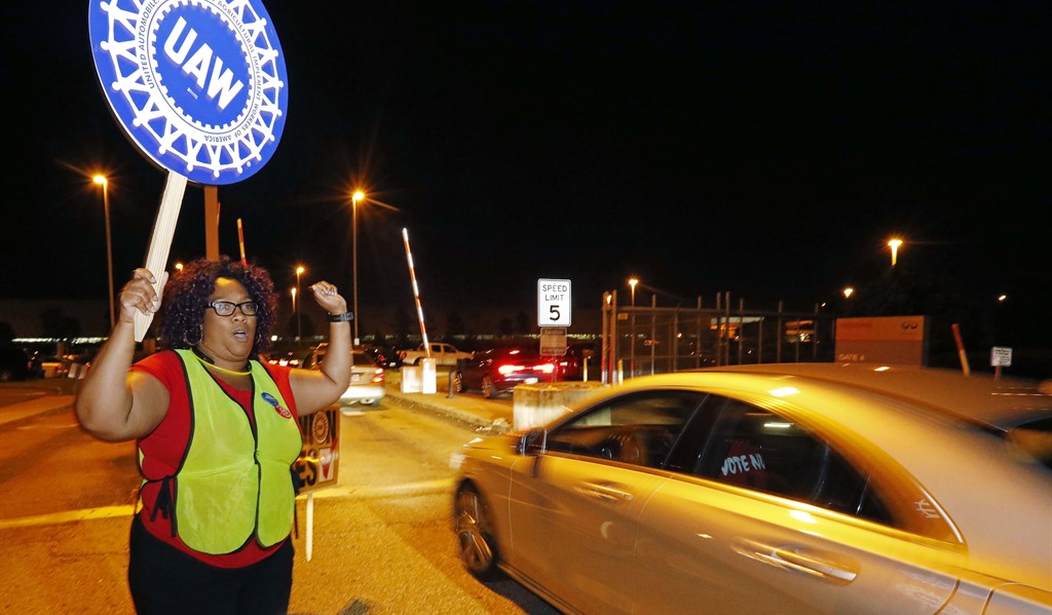Now that the United Auto Workers (UAW) are ramping up their aggressive strike tactics against two of Detroit’s Big Three automakers, it is becoming increasingly clear that this new economic disruption is here to stay. As a result, the union – and Ford, Stellantis, General Motors, and elected officials – need to ask themselves whose side the public will take in the dispute, and plan accordingly.
Unfortunately for the UAW and its leadership, the basic fact pattern offers a hint: when the full story of the strike is told, most Americans will eventually side with what is best for the economy and what will keep good jobs in America. That means the court of public opinion should, and likely will, land against the strike unless the union dramatically changes course.
Let’s start with the obvious: most people are struggling in the current economic climate. The economy is the No. 1 issue going into 2024 for 60 percent of voters. Inflation has wiped out $5.5 billion in Americans' savings. Almost 80 percent of Americans say they are living paycheck to paycheck.
So, it shouldn’t come as a surprise right now that organized labor is making a comeback. The UPS Teamsters scored a victory over the summer, perhaps the highest-profile of the 230 strikes this year involving more than 320,000 workers.
But the public perception of strikes varies from industry to industry. Most people feel bad for those stuck in Jeff Bezos’s sweatshops, but don’t really care about Hollywood writers. Everyone who learned that the teamsters didn’t even have AC in their trucks took their side against management, but the UAW situation is nowhere near as sympathetic.
It’s garnered massive media attention and revealed the bizarre political climate of the day with both President Joe Biden and former President Donald Trump claiming to be Detroit’s best friend. Leadership appears emboldened by the recent labor wins, but they’re reaching for so much they could ultimately jeopardize their own members' livelihoods.
Recommended
Their demands include:
- A 46 percent pay bump over four years
- 40 hours of weekly pay for only 32 hours of work
- Staffing top UAW earners at electric vehicle battery factories currently being built with South Korean battery makers
Everyone would like to get that kind of extra pay from their employers. In fact, most of us would be happy with the counteroffer Detroit’s car companies made of a 14.5 percent pay bump over four years.
Union leaders look to alienate even their own workers, with Ford threatening to lay off 600 workers in retaliation to the UAW strike. Losing employees may not be good for Ford’s bottom line in the short term, but company leadership seems to have determined that caving to excessive demands is worse in the long term.
Some predict that the auto workers strike could have “ripple effects, worse than 2019 strike,” with USA Today saying it could cause a recession. So take those 80 percent of Americans living paycheck to paycheck, then make everything worse. How will that play out for UAW in the court of public opinion?
It’s like the classic union episode of The Simpsons, where a turn of the century factory worker explains to his corrupt boss, “You can't treat the working man this way. One day, we'll form a union and get the fair and equitable treatment we deserve! Then we'll go too far, and get corrupt and shiftless, and the Japanese will eat us alive!”
Add it to the list of the times The Simpsons told the future.
One economist over at Real Clear Markets posits that if the strike is “successful,” it will make domestic cars so unaffordable that people will stop buying them, thus making any victory a very short lived one. And Tesla is set to “pop the champagne” over anything that cripples its competitors.
The short-term victory versus long-term implications is something the UAW must consider in terms of its long-term image. Is this strike worth crippling the economy and handing an irreversible advantage to its competitors?
Everyone wants more money and benefits, but the UAW’s demands seem to go so far they could undermine their own business interests. The bottom line: If the UAW don’t want to be in business with management, they might not be in business at all.

























Join the conversation as a VIP Member